April 13, 2025 | 19:58 GMT +7
April 13, 2025 | 19:58 GMT +7
Hotline: 0913.378.918
April 13, 2025 | 19:58 GMT +7
Hotline: 0913.378.918
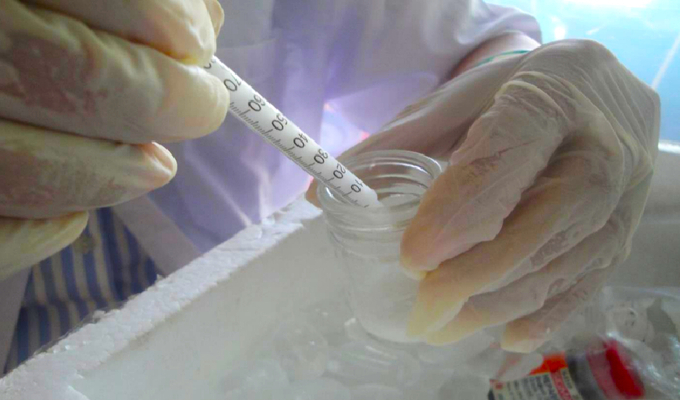
The Fleming Fund has played a key role in enhancing Vietnam's capacity to address antimicrobial resistance. Photo: TTS.
The British Embassy Hanoi, in collaboration with FHI 360 launched the second phase of the UK's Fleming Fund Country Grant (FFCG) awarded £3.4 million for Vietnam to continue their vital work on tackling antimicrobial resistance (AMR).
Led by the UK Govemment, the Fleming Fund supports low- and middle-income countries in improving AMR surveillance systems, enhancing laboratory capacity, and promoting the use of quality data for informed decision-making to address the growing issue of AMR.
The second phase of the FFCG marks the continuation of dedicated efforts to combat AMR in Vietnam. This significant event reinforces the importance of the nation's surveillance systems for AMR, antimicrobial use (AMU), and antimicrobial consumption (AMC) across human health, animal health, and environmental sectors.
Demonstrating the in-country progress, the launch event brought together esteemed government officials, practitioners, and key stakeholders. The occasion highlighted the collaborative spirit that defines the UK Government's approach to combating AMR, celebrating Vietnam's efforts and a shared commitment to tackling one of the world's most pressing health chaltenges.
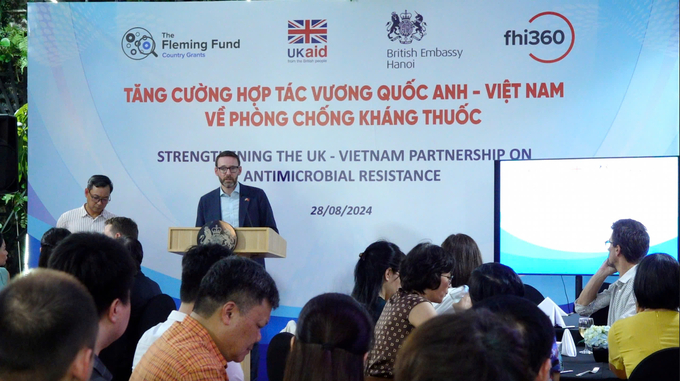
British Ambassador to Vietnam, lain Frew, reflected on Vietnam's pioneering role in addressing AMR. Photo: Thanh Thuy.
In his speech, British Ambassador to Vietnam, lain Frew, reflected on Vietnam's pioneering role in addressing AMR. He said: "Both the UK and Vietnam are committed to being responsible international players in addressing the challenge of Antimicrobial Resistance. Fleming Fund Phase Il continues our shared efforts not only to improve Vietnam's AMR management but also to create a model for other countries facing similar challenges, enhancing global cooperation on AMR."
Dr. Nguyen Thi Thu Nam, FHI 360 Country Director, expressed enthusiasm about the upcoming phase. The Fleming Fund has been instrumental in enhancing Vietnam's capacity to combat antimicrobial resistance. Together with our partners, FHI 360 is committed to driving forward the achievements and ensuring a lasting impact, she stated.
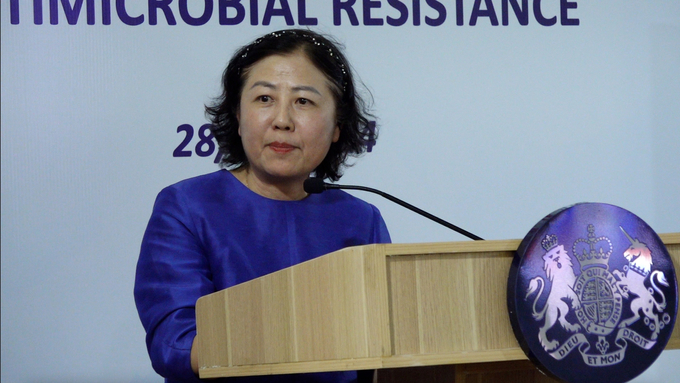
Ms. Nguyen Thu Thuy, Deputy Director of Department of Animal Health shared that throughout the program, laboratories have been strengthened their technical capacity in data management and reporting. Photo: Thanh Thuy.
From the part of Ministry of Agriculture and Rural Development, Ms. Nguyen Thu Thuy, Deputy Director of Department of Animal Health shared that, among many other Official Development Assistance programs for Vietnam, the Fleming Fund Country Grant provided by the UK Department of Health and Social Care has been a strategic funder to Vietnam in addressing antimicrobial resistance.
During the phase 1 of the Fleming Fund Country Grant for Vietnam, under the coordination of FHI 360 Vietnam, three laboratories in animal health was supported and participated in the national AMR surveillance system in animal health sector. Throughout the program, those laboratories have been strengthened their technical capacity in data management and reporting, enhanced biosafety and biosecurity and information management. Besides, those laboratories has received supports in infrastructure renovation and procurement of equipment.
To date, the national active AMR surveillance is conducted on annual basis for period 2021-2023 by Department of Animal Health with support from Fleming Fund in 15 provinces. The AMR data have reported to AMR portal and analyzed by WHONET. AMR data were shared with authorities of the 15 provinces and the three AH laboratories and were used as references by Thanh Hoa, Dong Nai and Ho Chi Minh City to plan, develop and implement their provincial active AMR surveillance in 2023. Besides this, the AMC data on the central AMU/AMC portal (funded by FF) reported monthly by veterinary drug importers and producers are available for DAH to report the national antibiotic use for animals to World Organisation for Animal Health (WOAH) following its formatted report requested.
Department of Animal Health’s leader looks forward to the second phase of the Fleming Fund Country Grant for Vietnam to continue its dedicated efforts to combat antimicrobial resistance which has been a significant and complex global problem these days.
From May 2019 to April 2024, FHI 360 in collaboration with government counterparts and sub-grantees in Vietnam successfully implemented the FFCG for Vietnam phase I with funding of £8.8 million. This involved the establishment of core AMR surveillance networks across 17 laboratories, 3 National Reference Laboratories in human health, and 3 laboratories in animal health. The enhancement of laboratories in strengthening technical capacity, data management and reporting, biosafety and biosecurity practice, the improvement of information management systems, infrastructure renovation, and equipment procurement are noted as key achievements.
The event also acknowledged the extensive training and workshops that have strengthened human resource capacity and the development of crucial regulatory documents and guidance on AMR/AMU. These efforts have set the stage for active AMR surveillance in chickens and pigs - supporting the national strategy to apply One Health, promoting a unified approach to AMR knowledge sharing.
£3.4 million was allocated from May 2024-December 2025 for phase II of this project to further strengthen surveillance systems for AMR/U/C in human health, animal health, and the environment through a One Health approach. This phase will see continued collaboration among FHI 360, National Institute of Hygiene and Epidemiology, Oxford University Clinical Research Unit (OUCRU), PATH International, and national partners such as the Medical Services Administration - Ministry of Health, Department of Animal Health - Ministry of Agriculture and Rural Development, and the Pollution Control Department - Ministry of Natural Resources anc Environment.
Translated by Dieu Linh
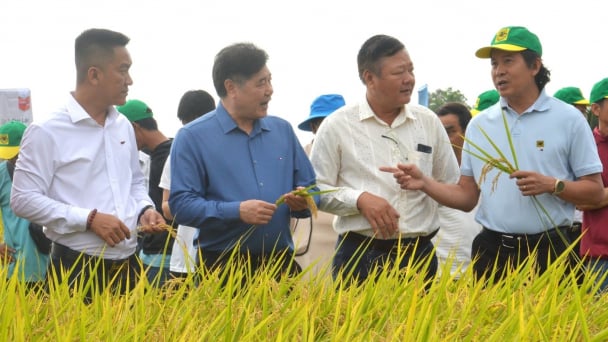
(VAN) The results from pilot fields are catalyzing the expansion of the One million hectares of high-quality, low-emission rice project in Kien Giang.
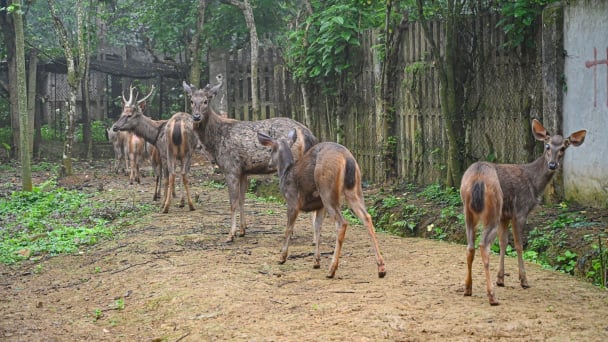
(VAN) On the morning of April 11, Cuc Phuong National Park received 18 individuals of endangered and rare wild animals from Da Nang city.
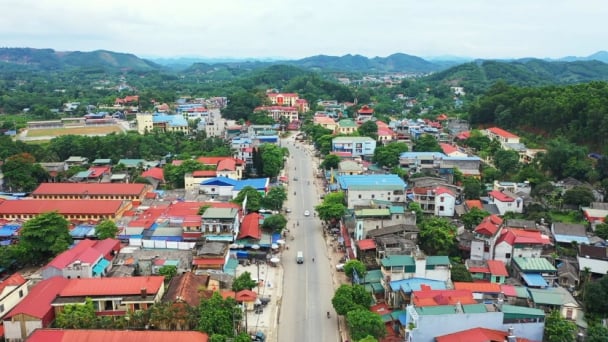
(VAN) FAO supports Vietnam in enhancing survey sampling techniques for the 2025 nationwide agricultural and rural census.

(VAN) By participating in the green transition, manufacturers become an indispensable part of the circular economy, contributing to resource optimization and environmental protection.
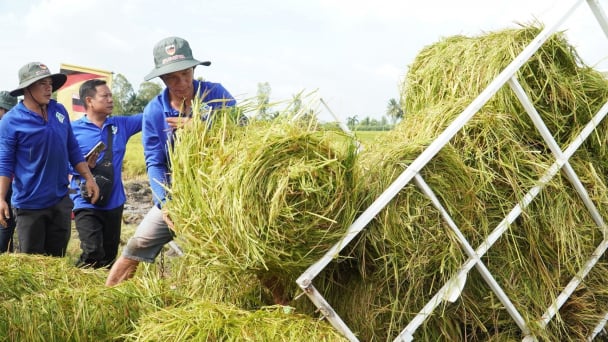
(VAN) The One Million Hectares of High-Quality and Low-Emission Rice Program can generate nearly 14 million tons of straw annually, posing an urgent requirement to diversify straw-based products.
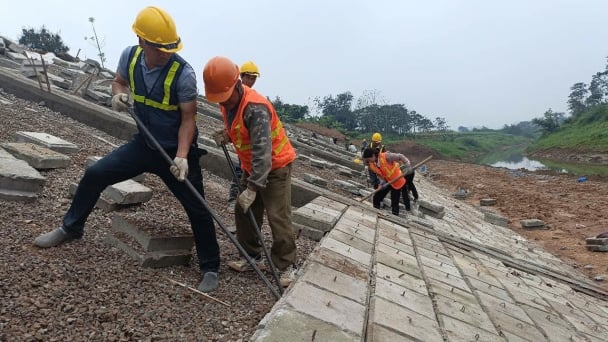
(VAN) This figure was recently announced at a conference held in Yen Bai, focusing on climate-resilient infrastructure development for ethnic minority regions.
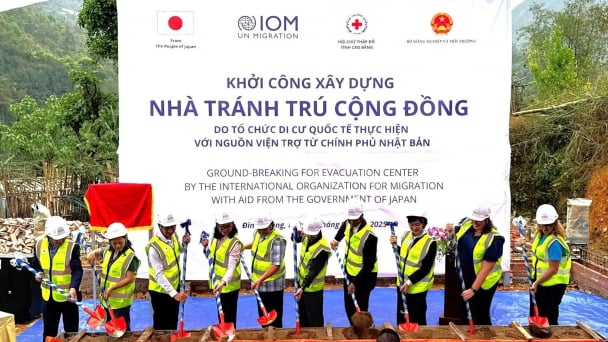
(VAN) The evacuation center is a practical work in efforts to respond to natural disasters and adapt to climate change in vulnerable areas.